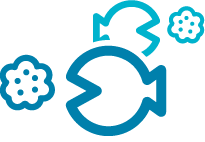Sustainable fisheries
Sustainable fishing, or what kind of fishing?
Sustainable fishing does not upset the natural balance in the marine ecosystem, leaves more fish in the seas and oceans, and benefits other marine animals.
As conscious consumers, we increasingly expect confirmation that the fish we buy comes from sustainable fisheries in the Baltic Sea.
What are sustainable fisheries
Minimise impacts on animals and the marine ecosystem. They are conducted responsibly, in accordance with applicable law. Shipowners must adapt to environmental conditions that are constantly changing and keep fishing at levels that ensure the continuity of populations of the species concerned.
Sustainable fishing has an impact on the future of the environment, ours and our children. It is worth supporting those companies that apply responsible fishing rules and care for the sustainability of nature.
Sustainable fishing does not always mean catching fewer fish. It's about catching fish at an acceptable level (known as maximum sustainable yield, MSY) while respecting scientific advice. It is also important to use techniques and selective fishing gear that ensure the long-term conservation of valuable fish stocks and elements of the Baltic ecosystem. It is also important to use techniques and selective fishing gear that ensure the long-term conservation of valuable fish stocks and other components of the Baltic ecosystem.
What threatens the sustainability of the marine environment
Overfishing.& nbsp;It occurs when more fish are taken from a stock in a given period of time than will be able to reproduce. This disrupts the natural population balance of the stock and its ability to replenish itself. Overfishing is a global problem. According to the United Nations, nearly 30 per cent of the world's fish stocks are overfished and about 60 per cent & nbsp;re overfished. In the Baltic Sea both cod stocks (eastern and western) are overfished, whereas herring stocks of the central Baltic and sprat stocks of the whole Baltic are fished sustainably.
One reason for overfishing is the excessively high catch limits set by the European Union every year. Another cause is the overcapacity of the fishing fleet - the fleet is so numerous and well-equipped that it has enormous capacity to catch fish. Another is IUU fishing, which is illegal, unreported and unregulated fishing.
Destruction of the seabed.& nbsp;This occurs with, among other things, the use of bottom trawls. This is the fishing practice of dragging a huge weighted net along the seabed and scooping up all the organisms living near the seabed (whether they were targeted or not) inside the net. This method causes enormous damage to the marine environment and leads to the destruction of valuable marine habitats.
Dangerous by-catch.& nbsp;Anything that falls into a fisherman's net that was not the target of his catch is called by-catch. Its victims include fish of other species, but also porpoises.
Sustainable fishing is about using selective fishing gear to keep by-catch to a minimum.
Fish with a quality mark
"Fish and seafood are the dietary basis for over billion of people worldwide. The well-being of 1 in 10 people in the world is dependent on responsible fisheries management" says Anna Dębicka, MSC of Poland. The decisions we make in stores every day influence what our fish producers and fishermen do. If we choose products with the MSC logo, more and more companies will comply with sustainable fishing standards.
The blue MSC sign (Marine Stewardship Council) can be found on wild fish and seafood. Those that come from fish and seafood farms are marked with the green ASC sign (Aquaculture Stewardship Council).
NATURAL FROM BALTIC, in turn, is a logo, which informs us that we are dealing with a Baltic fish, caught by Polish shipowners, of the highest freshness categories ("extra" or "A"). This sign is used by Polish producers, who comply with the highest quality and environmental standards.
Fish Forward
A project implemented by 17 partners in 17 countries, including WWF Poland, between 2018 and 2020. Its aim is to change the behavior of consumers and producents in Europe by increasing knowledge about consumption and sourcing of fish and seafood, as well as the effects our decisions are having on people and the marine environment. More information about the ongoing activities can be found on the website: flashforward.eu.
What can you do?
Your everyday choices have an effect on the environment. The rules are simple:
- do not buy juvenile fish, i.e. undersized fish that have not yet had a chance to produce offspring;
- pay attention to where the fish you are buying comes from. The amount of fish of a particular species may be stable in one body of water, but very low in another;
- choose fish from local catches. They are fresher and take less time to transport;
- buy fish from (aquaculture) fish farms;
- only buy those fish which are not endangered species (check Polish IUCN Red List of Threatened Species)
- buy vertified fish products. Check for signs NATURALNIE BAŁTYCKIE, MSC, ASC or organic food production certificates.
 English
English
 Polski
Polski
 Deutsch
Deutsch

